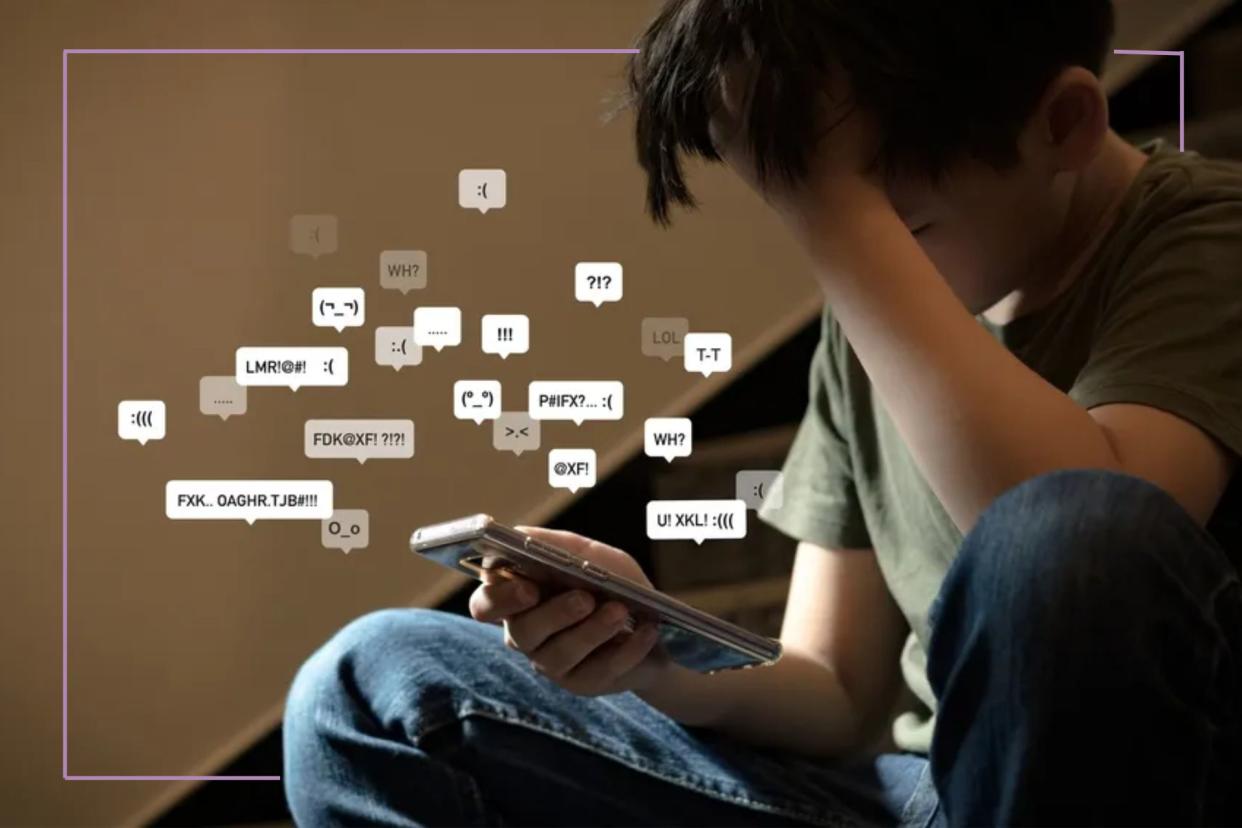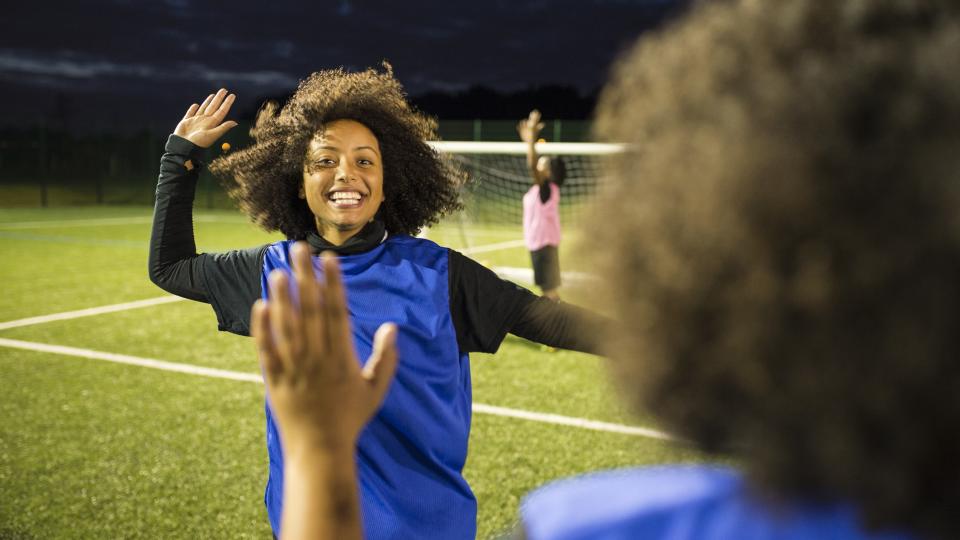Worried about social media affecting your teen's mental health? We share 11 expert-approved ways to support and protect your child

We need to talk about social media, and we need to talk about it now. That’s the message mental health experts are telling us here at Good to Know, and it’s one we, as parents, simply can’t ignore anymore.
Okay so yes social feeds can help our kids learn and connect with their peers, but more and more research is telling us how bad social media is for kids, platforms such as Instagram and Facebook are starting to impact our children’s mental health in serious ways, contributing to an increase in depression and anxiety, poor body image and even addiction. We have in-depth articles answering both 'is Instagram safe for kids' and 'is Facebook safe for kids' questions that so many parents have, take a read through - the expert input is so useful.
“There are abundant risks to young adults and children on social media, including social comparison and anxiety, body image concerns, cyberbullying, and dangerous behaviours caused by ‘the fear of missing out’ or FOMO,” says Dr Lisa Strohman, a clinical psychologist and author of several books, including Unplug: Raising Kids In A Technology Addicted World, and Digital Distress: Growing Up Online. “The barrage of trips, parties, and life events being plastered online makes it seem that others are leading fabulous lives while you are home on your couch.”
For this article we’ve spoken to a series of parenting experts and mental health specialists about how social media can affect your child’s mental health, and we’ve got practical and realistic tips for parents on how to support and protect your child. You’ve got this.
How does social media affects teenagers’ mental health?
Depression and anxiety: Social media use is linked to depressive symptoms, anxiety, and loneliness, and the more time teens spend on their smartphones, the higher their levels of depression, insomnia, and anxiety are one year later.
Addiction: Social media can be addictive, leading to compulsive use. Studies show high levels of screen time and social media use are associated with addiction and other adverse mental health outcomes.
Body image problems: The distortion of reality that kids see on social media platforms (filtering, posed, touch-up shots) can lead to body image issues like body dysmorphia, contributing to mental health problems such as depression and anxiety.
Sleep disturbance: Excessive social media use, particularly before bedtime, can interfere with sleep patterns, contributing to sleep problems and exacerbating mental health issues.
Cyberbullying: Social media exposes children to risks like cyberbullying and online grooming. These experiences can lead to depression, anxiety, and other mental health problems. A recent ONS report shows that 1 in 5 children aged 10 to 15 experienced cyberbullying in the past year.
Physical health and diet: Social media also indirectly impacts physical health. Prolonged use can lead to obesity and poor physical health, which are linked to mental health issues.
Pick any mental health problem teenagers currently face, and you’ll find social media is a crucial factor. In 2022, a large-scale review across multiple countries looked at dozens of studies into social media and its effect on children's and teens’ mental health. It found evidence that social media platforms can contribute to the following six mental health problems:
What do the statistics around social media and mental health tell us?
Social media use among children and teenagers is causing significant concern for many parents, as shown in the 2024 Public Perceptions Survey by the British Association for Counselling and Psychotherapy (BACP). Nearly half of parents (47%) worry about the impact of social media on their children's mental health, up from 41% last year. This rise shows that more parents are becoming anxious about how social media affects their kids.

The survey also found that almost nine in ten parents (86%) of children aged 4 to 17 are worried about how much time their kids spend on social media, with half of them being very worried. This widespread concern suggests that many parents see social media as a potential problem for their children.
In fact, more than two-thirds of parents (67%) think that social media use is negatively affecting their family life by disrupting how they interact and spend time together. Parents also reported that their children spend a lot of time on their phones. 61% said all their children spend at least one hour a day on their phones, and 31% said their kids spend three or more hours daily. The study also found that uncontrolled social media use can lead to sexting, exposure to pornography, exposure to unwanted sexual material online, and earlier sexual activity.
How to help reduce the negative effect social media is having on children
So what can we do, as parents, to help protect our kids' mental health and foster a healthy way of engaging with social media? We asked some of our leading experts on child mental health to give us their top tips.
1. Have open communication
“Children are more likely to discuss their worries regarding what they have been viewing online if you establish open communication,” says parenting expert Matt Buttery of Triple P, a positive parenting programme available in the UK and Ireland. ”Parents can achieve this by opening conversations about what’s new online and anything that’s bothering them, and offering support and guidance along the way to help keep children as safe as possible.”
Neuroscientist Dr Huriye Atilgan agrees. “By fostering an environment of openness, you can help remove any misplaced guilt, shame, or discomfort your cold or teen might feel.”
2. Have a plan for peer pressure
“Peer pressure can sometimes lead to young people engaging in risky behaviour online,” says Matt. “Help your kids prepare for this by letting them know it’s ok to say no and talk about any worries they may have.
“To help manage this, devise a plan - with your child - to help them tackle peer pressure so they are prepared should a situation arise. For example, they can be encouraged to think up a line to say no to peer pressure and avoid engaging in dangerous behaviour online. This will help them gain the confidence to say no outright.”
3. Educate yourself on parental controls
When it comes to social media, it’s crucial to be aware of all the safety features and parental controls on offer, but we appreciate that social media companies don’t always make this easy. That’s why we’ve put together an in-depth guide to helping your child stay safe on social media. “Convincing teens that something they love and find such profound connection in is bad for them is challenging,” says child and adolescent psychologist Dr Ashley Harlow.

“Before any conversation with a teen about a social media platform, be sure you understand some technical aspects. You cannot advocate limiting notifications if you don’t know where or how to manage that feature.”
That said, be prepared for the day your kid learns to overrule your parental controls. “If my work with teens has taught me anything,” says Dr Ashley, “It’s that kids can overcome technological controls as fast as adults can implement them.”
4. Consider delaying giving your child a smartphone
A growing number of parents in the UK and elsewhere are pledging not to give children a smartphone until they’re at least 14 with Kids For Now, a group dedicated to encouraging parents to connect and build local communities to delay smartphones and help keep kids off social media until they are at an age where they're mature enough to handle it. The more parents sign up, the less peer pressure your child will face in the future to own a smartphone and be on social media.
5. Encourage more physical activity and face-to-face interactions
Spending too much time on social media can lead to a sedentary lifestyle and social isolation, which can negatively impact mental health. Encourage your children to engage in physical activities, sports, or hobbies that involve face-to-face interactions with friends and peers. This can help them maintain a healthy balance and develop real-world solid social connections.

“Encouraging healthy activities that meet some of the same needs as social media can be helpful,” says Dr Ashley. For instance, joining teams, getting involved in extracurricular activities (even gaming club puts teens in the same room with each other!), or exercising can support the health behaviours often undermined by social media use.”
6. Look out for signs of cyberbullying or social media addiction
Be aware of the signs that your teen is a victim of cyberbullying or developing an unhealthy addiction to social media. These can include changes in mood, sleep patterns, poor school performance, or continually checking updates.
7. Big up positive body image at home to help their self-esteem
The filtered and edited images and videos they see online can directly contribute to totally unrealistic body image expectations and low self-esteem, especially in teenagers. Encourage your kids to be critical of the edited and filtered content they see online and talk about positive body image and self-acceptance at home.
8. Set a good example with your own social media use
Children learn by example, so model healthy social media habits yourself. Limit your time on social media, avoid sharing personal or inappropriate content, and be mindful of how you interact with others online.
A post shared by Emily Cherkin (@thescreentimeconsultant)
A photo posted by on
9. Encourage a variety of interests and hobbies
Living in an echo chamber? We all know how social media can create a narrow view of the world, even more so for kids. Encourage your children to pursue lots of different interests and hobbies outside of social media, helping them to develop a well-rounded perspective and a sense of purpose beyond their online presence.
10. Discuss the dangers of 'oversharing'
Educate your kids about the risks of oversharing personal information, intimate photos, or inappropriate content on social media. Let them know that others can and will share or misuse it, leading to embarrassment, cyberbullying, or even legal consequences. Depending on their age and what's appropriate, you can point them to plenty of horrific examples in the news of what happens when kids are trolled, bullied or hacked online.
11. Take digital detoxes
Encourage your children to take regular breaks from social media, during mealtimes, family activities, or before bedtime. This can help them disconnect from the constant stream of online content and focus on real-world connections and activities.
“The sleep battle is one worth fighting,” says Dr Ashley. “Although many teens claim they ‘need’ their phones to use other features—such as the alarm to wake up in the morning or music apps while they sleep—the allure of the social media apps and the conditioned response of the notifications are often not worth the risk of making the phone available in the bedroom overnight. Find other ways to meet the need for an alarm clock or music.”
“Finally, and most importantly, keep your relationship with your teen central,” reminds Dr Ashley. “You care about them, their safety and happiness. You want them to have all the amazing benefits of social media, but not at the cost of their mental health and sleep.”
Experts we spoke to
Get more advice on setting device limits and improving online safety for your child, from 15 'life-saving' questions to ask your child if they’re online gaming to 4 tips to stop kids from doom-scrolling. Plus, what you need to know about cyberbullying, including the sites and apps all parents need to be aware of.

 Yahoo News
Yahoo News 
